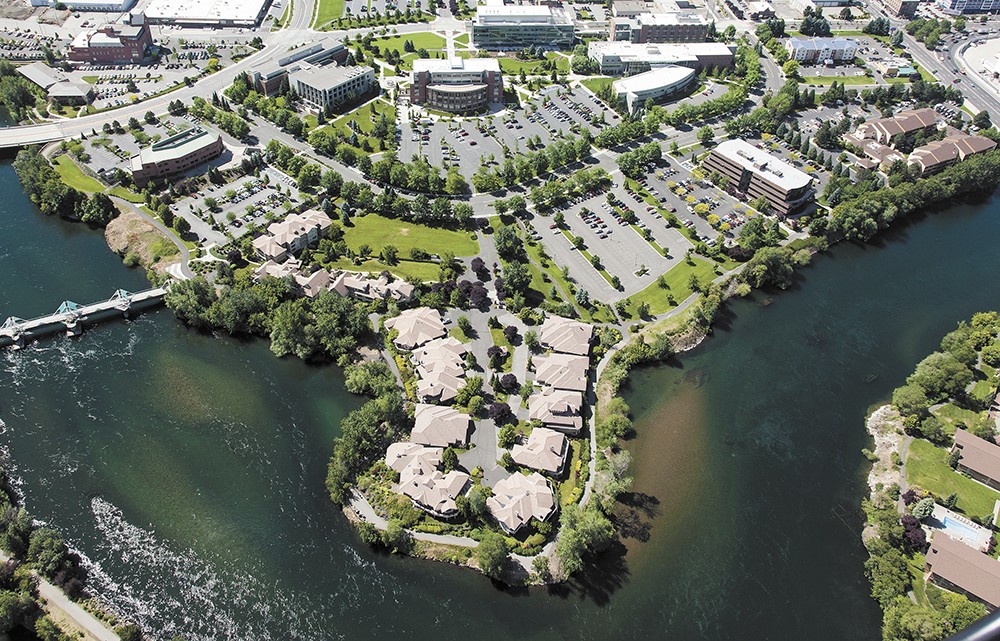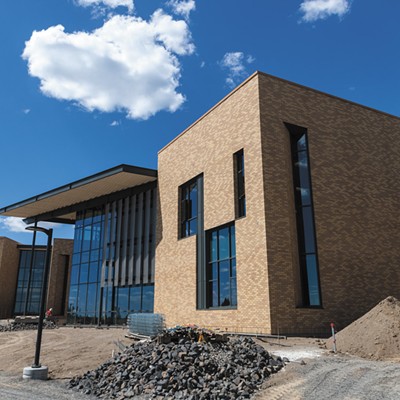The second public medical school in the state of Washington isn't ready for students quite yet, but researchers from across the university's other colleges are already working to build partnerships with the new addition. Washington State University recently announced the allocation of $30 million for joint research initiatives, at least $5 million of which will include contributions for the brand-new Elson S. Floyd College of Medicine in Spokane.
The money was awarded through the university's Grand Challenges research initiative. The projects that will involve the new med school will explore a wide scope of medical and public health issues, including genetic editing, antimicrobial resistance, disparities in availability and quality of health care, and health impacts of the Smarter Cities Challenge.
Some specific details are still in the works, but each of the projects will benefit greatly with collaboration from the new medical school, says John Roll, Senior Vice Chancellor for WSU Health Sciences in Spokane and interim Vice Dean for Research for the College of Medicine.
"All of these initiatives will help the entire university, kind of like a rising tide floats all boats," Roll says. "They capitalize on our historic strengths in agriculture, veterinary medicine, social, computer and environmental sciences, and give us the opportunity to link them to human health, which is somewhat novel for WSU as a system."
We reached out to a couple of researchers to talk about their projects. Here's what they had to say:
We know resistance to antibiotics is a worldwide issue, yet to fully understand the problem, there is still work to be done. We know, for example, that using antibiotics too frequently and taking more or less than the prescribed dose facilitates resistance to antibiotics.
What we're less sure of is how social and environmental factors play a role. That's where the Community Health Analytics Initiative comes in.
"The new angle we're seeking is we're trying to find a relationship between antibiotic resistance and living in rural communities," says Behrooz Shirazi, director of WSU's School of Electrical Engineering and Computer Science. "This problem has been studied in hospitals and cities, but very little in rural areas."
Research on antimicrobial resistance is only a piece of a much larger plan, Shirazi says. In the long term, he and his team hope to use the nearly $5 million over five years as seed money to start a more permanent health analytics institute. The idea is to create a regional hub of information.
Professors and researchers from multiple focus areas, including mathematics, engineering, computer sciences, public health, health care and veterinary care, will contribute to efforts to understand a variety of issues through data analysis.
Individuals and communities living in poverty can be subjected to disparities in access to and quality of health care. Yet some who fit that profile prosper. Why?
That's what a team of approximately 12 WSU researchers aims to find out with this research collaboration addressing health disparities.
The idea here is to pull from expertise in basic biology, health care, public health and sociology and explore these disparities on multiple levels, says Paul Whitney, Associate Dean for Research in the College of Arts & Sciences.
For example, "We're interested in the effects of chronic stress and nutrition on individuals' health," Whitney says. "So rather than a team that addresses health disparities in cardiovascular disease or the prevalence of diabetes among certain racial groups, we're looking at specific foci and cutting across multiple conditions."
The initiative was granted $4.1 million over five years.
Other projects benefitting from the research grant will focus on genetic editing and developing smart cities.
The Functional Genomics Initiative ($5 million over five years) will explore emerging science in DNA editing of plants, livestock and other large animals to look for ways to control diseases.
Specifically, this project will use a gene-editing technique known as clustered regularly interspaced short palindromic repeats, which can manipulate DNA with precision.
As for the Holistic Approach to Developing Smarter Cities ($1.5 million over five years), researchers will monitor, predict and control energy and air quality in urban environments in order to note how those things impact human health.
"These projects are all so big, it's hard to know where they're going to go," Roll says. "I think that they all have the potential to benefit multiple constituents in and outside of the university, and the opportunity to blend experts in health sciences with our historic strengths is exciting. I think they'll bear a lot of fruit for people who need some help." ♦





















